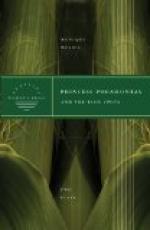“But why?” asked Claw-of-the-Eagle.
“Because by going I believe I can serve both our nation and the English. My Brother, John Smith, said we must be friends, and I promised him e’er he left to watch ever over the welfare of his people. My father loveth me so much that in order to free me I think he will do as the English wish, and so I will go with Captain Argall that the strife may cease between them and us. But,” and here her voice rose so that Claw-of-the-Eagle had to remind her of their danger by a pressure on the hand, “but I will not intercede for that traitor Japezaws and his crafty squaw. My father may wreak vengeance on them when he will.”
Her voice, low as it was, had risen in her emotion, and the boy’s keen hearing had caught the movement of a man’s foot on the wooden deck. They kept still, breathless, for a moment; then as all was still again, Claw-of-the-Eagle asked sadly, in a tone that mourned as wind through the pine trees:
“Then thou wilt not come with me? I had built a lodge for thee, Matoaka, with a smoke hole wide enough to let in the whole moon thou lovest. My arrows had killed young deer and turkeys and I had smoked and hung meat for thee to last through all popanow (winter). A young maid is lonely till she follows her brave—all this I came to the village of Japezaws to pipe to thee. Now I have run wounded through the forests and swum the black stream to tell it to thee, and thou bidst me turn back alone. But if thou hast no wish to enter Claw-of-the-Eagle’s lodge let him at least escort thee safely to the wigwam of thy father.”
“I thank thee, Claw-of-the-Eagle, for all thou hast done,” she whispered, “and all thou wouldst do for me. There is no braver warrior in the thirty tribes and no better hunter since Michabo. But I have listened to my manitou and he hath said to me, ’Remember the word thou gavest to thy white Brother.’”
Claw-of-the-Eagle knew that it was useless to plead and yet he pleaded: “Come back with me, Matoaka; what are the white men to thee and me?”
But she whispered: “Go, Claw-of-the-Eagle, go quickly ere the sailors awake. Hasten back to old Wansutis that she may bind up thy wound, and to Powhatan and tell him that he must buy Pocahontas’s freedom from the English by returning their men he holdeth prisoners.”
While she was still speaking the young brave’s mind was working rapidly. At first the respect he owed her as the daughter of the great werowance was uppermost and he thought he must needs do her bidding and leave her. Little by little, however, he began to think of her as a young maiden, strong and courageous, but not so strong as a man, who now stood in need of the help of a brave. He hated the English more than ever, and Pocahontas’s promise to aid them seemed to him only a girlish foolishness. Let them all perish on their island or return across the sea whence they had come. Why should she go with them? Why should he let her go? Who knew what treatment she would receive away from her own people? If he should rescue her and bring her back to her father, would he not thus win great favor in the eyes of Powhatan, who would not refuse her to him as his squaw? If she would not come willingly, he would carry her off against her will for her good.




